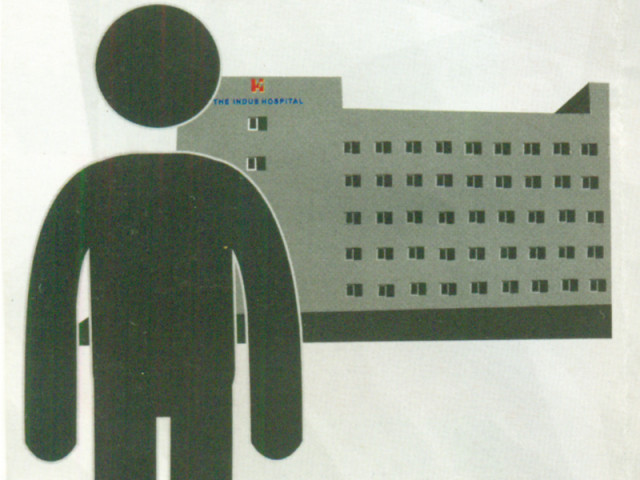Indus Hospital comes up with country’s first centralised blood centre
The centre will supply screened blood to partner hospitals to save patients from hassle.

Step 1: Go to the Indus Hospital or Blood Donor Lounge Camp to donate blood.

Step 2: Meet the blood banker so he can guide you about pre-donation screening

Step 3: During pre-donation screening, a blood banker will take your medical history

Step 4: A blood banker will ask questions about your health, lifestyle to prevent any viral infection transmission from your blood

Step 5: A blood banker will perform a short health exam - checking your pulse, temperature, weight and blood pressure

Step 6: You will then proceed to a donor bed where your arm will be cleaned and a professional will use a blood donation kit to draw blood

Step 7: After the procedure, you will receive refreshments till the blood is drawn out

Step 8: A blood banker will thank you for saving three lives just by donating blood
Timely access to screened blood in hospitals has been a persistent problem in Pakistan and people usually end up losing the battle for their lives because of the non-availability of blood.
Keeping this in mind, the Indus Hospital opened the ‘Indus Hospital Blood Center (IHBC),’ on Tuesday. The IHBC is Pakistan’s first centralised blood centre and will provide international quality screened blood to hospitals across the city.
“There will be a marked shift in the way we think and strive to arrange blood for our loved ones in times of emergency,” said the IHBC director, Dr Saba Jamal.
Highlighting the importance of availability of screened blood at hospitals, Dr Jamal anticipated that the project will save millions of lives through the acts of voluntary donors, who will be the ‘backbone’ of the project.
She expressed the hope that with the implementation of the project, families will cease to experience the feelings of helplessness when their loved ones require blood in dire situations. “The centre will provide blood to partner hospitals and the patients will receive blood as if they get medicines from a pharmacy.”
In our society, said Dr Jamal, the responsibility of arranging blood lies with the patient’s family and that too, in exchange for blood. She said that the IHBC will ensure the safest delivery of blood from vein (donor) to vein (patient). “Ensuring the provision of blood at the right place at the right time is our prime goal.”

At the IHBC, which started functioning a few months before its formal inaugural, blood is obtained solely from ‘Voluntary Blood Donors’, ensuring low-risk donations, explained Dr Jamal. She added that an ‘Online Blood Ordering System’ is also available for partner hospitals where they may make requests for the required quantity of blood online. The IHBC supplies screened and tested blood directly to the hospitals, maintaining the cold chain which ensures that the blood reaching the patient is optimal, she added.
Businessmen Group chairperson, Siraj Kassam Teli, the chief guest at the occasion, was of the view that projects like these proved that our health sector was on the road to major developments. “It is a new system and a good stand taken by the IHBC.”
Citing difficulties in the arrangement of blood, Teli stressed all blood centres operational in the city need to join hands to effectively deal with the problems being faced by the patients. He assured that the business community will keep backing such projects which were in the larger interests of the public.
“We are all opportunists. We don’t think about others’ difficulties until we go through the same,” lamented Farhan Hanif, the man whose efforts and support was pivotal to the realisation of the project. Hanif’s daughter, Ayesha, was born with a condition because of which she could not produce enough blood and had died a year later.
It was after the loss that he had realised the importance of a blood centre and started vying support for a blood centre so that the timely availability of screened blood was made possible for everyone in need. He had urged everyone to donate generously to save lives of millions.
The Indus Hospital’s CEO, Dr Abdul Bari Khan, said that it was through the support of the generous donors that had enabled them to benefit 1.5 million patients till now - a number that keeps increasing with each passing day. He urged people to support the IHBC by either donating their time, money or blood.
Revolutionising the practice
In Pakistan, common practice entails the use of blood as a whole product - a method that is inefficient and leads to a lot of wastage. Internationally, blood is broken down into constituent products to avoid this wastage.
At IHBC, blood’s components such as the platelets, red blood cells and fresh frozen plasma are separated as there are hospitals that need platelets more than red blood cells and they tend to waste the product they don’t need. The centre will collect the blood, make products and distribute them to the hospitals according to their requirements.
In addition, IHBC has also introduced the ‘Hayat-e-Naumolood’ programme, through which sealed and sterilised Peads Bags will be sent to the neonatal ICUs of partner hospitals. As many as six paeds blood bags may be made from adult blood bag.
Published in The Express Tribune, October 31st, 2013.



















COMMENTS
Comments are moderated and generally will be posted if they are on-topic and not abusive.
For more information, please see our Comments FAQ